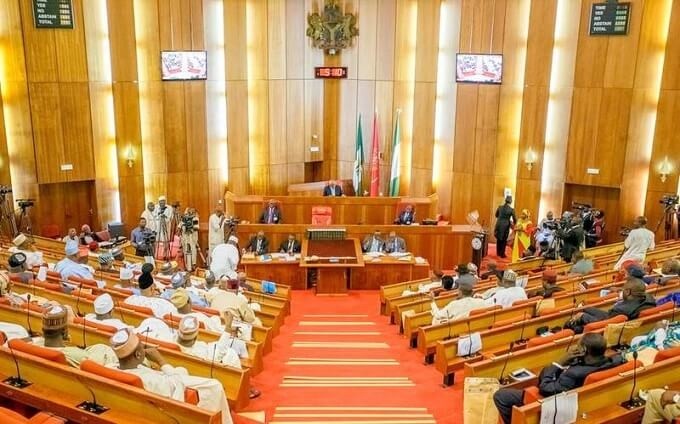
The Nigerian Labour Congress (NLC) and human rights lawyer, Mr. Femi Falana have condemned the Nigerian Senate over its attempt to amend the Code of Conduct Bureau (CCB) and Code of Conduct Tribunal (CCT) Acts.
Recall that last week, the Senate began the process of amending the CCB and CCT Acts by initiating two bills.
The first amendment bill, sponsored by Senator Peter Nwaboshi, (Delta North) and entitled: ‘Code of Conduct Act Cap C15 LFN 2004 (Amendment) Bill 2016,’ was first laid before the Senate last Tuesday.
Advertisement
The second bill, sponsored by Senator Isah Misau (Bauchi Central) and entitled: ‘A bill for and Act to amend the Administration of Criminal Justice Act, 2015 and other related matters,’ seeks to remove the CCT from the list of courts statutorily empowered to initiate criminal proceedings against accused persons.
The first bill passed the second reading last Thursday barely two days after initiation, while debate on the second bill has been slated to commence this week.
In a reaction to the bill, the NLC President, Ayuba Wabba, said: “In the past one week, the Senate initiated a process for the amendment of the Act establishing the CCB and the CCT.
“It cited as reasons for the amendment, the need to give every public officer (appearing before the tribunal) a fair hearing, justice and equity (in line with the provisions of Section 36[2] [a] of the 1999 Constitution (as amended) and the need to remove from political control, the two bodies which now play a critical role in the administration of criminal justice system.”
Advertisement
The NLC president said that the congress was not pleased with the speedy reading of the bill on the floor of the Senate.
“In furtherance of its objective, the Senate fast-tracked the process of this amendment via two readings (first and second) within 48 hours. It has also set in motion the process for removing the jurisdictional powers of CCT on criminal matters via the amendment of the Administration of the Criminal Justice Act.
“In consideration of the fact that sometimes in most climes, corruption trials are triggered by reasons other than corruption, it makes a lot of sense to create legislations that guarantee fair trial and justice for the accused. Secondly, legislative amendments are part of the constitutional functions or duties of the National Assembly,” Wabba added.
The NLC stressed that the bill is dangerous and would not be in interest of the Nigerian public.
“However, we at the NLC hold the view that the noble intention of the Senate notwithstanding, the timing is suspect and fraught with danger.
Advertisement
Wabba stated that: “We do not think the privileges of the Senate President extend to exemptions from civil or criminal trials. At the moment, only the president and his vice, the governor and his deputy enjoy this rare privilege. Thus, what the Senate is trying to do is no more than a legislative ambush.
“We need not remind the Senate that we are all equal or ought to be equal before the law, in spite of our stations in life. We similarly believe that the fight against corruption should be total and not selective. If this amendment therefore is allowed to scale through, it would have set a dangerous precedent.
“Accordingly, the Senate would do well to listen to one of their own, Senator Yahaya Abdullahi of APC, representing Kebbi North. Timing is of essence here.”
On his own part, Falana in a letter addressed to the Speaker of House of Representatives, Yakubu Dogara said the National Assembly lacked legislative powers to alter any section of the CCB) and CCT Acts without amending some provisions of the 1999 Constitution.
In a two-page letter, Falana explained that the proposed amendment “is illegal and unconstitutional.
“In other words, without amending the relevant provisions of the Constitution, the proposed amendment of the Act is an exercise in futility.
Advertisement
“As the proposed amendment cannot alter, enlarge or curtail the relevant provisions of the Constitution the Senate ought not to continue to waste precious time and resources on the illegal exercise,” he said.
He said the whole exercise is a clear violation of paragraph 1 of the Code of Conduct for Public Officers enshrined in Part 1 of the Fifth Schedule to the Constitution, adding that section 3 of the Act which the National Assembly seeks to amend has become spent.
“Section 3 of the Act is in pari materia with Paragraph 3(e) of Part 1 of the Third Schedule to the Constitution. To that extent, section 3 of the Act is inoperative and invalid in every material particular.”
The senior advocate also cited a Supreme Court judgment stating that where the provision in the Act “is within the legislative powers of the National Assembly, but the Constitution is found to have already made the same or similar provision, then the new provision will be regarded as invalid for duplication and or inconsistency and therefore inoperative.
“The same fate will befall any provision of the Act which seeks to enlarge, curtail or alter any existing provision of the Constitution. The provision or provisions will be treated as unconstitutional and therefore null and void.”


